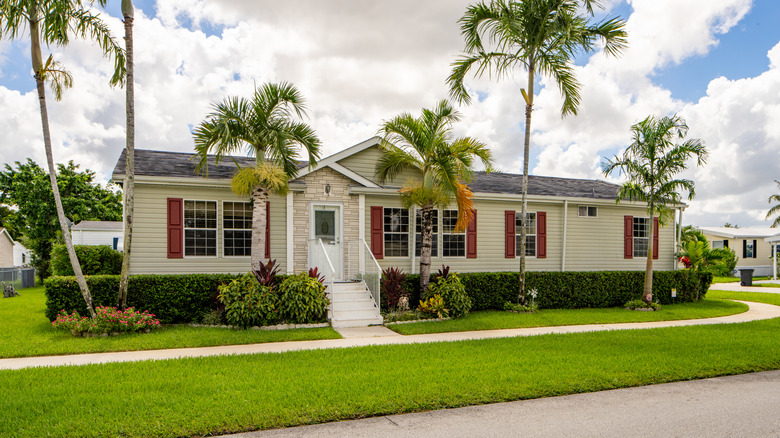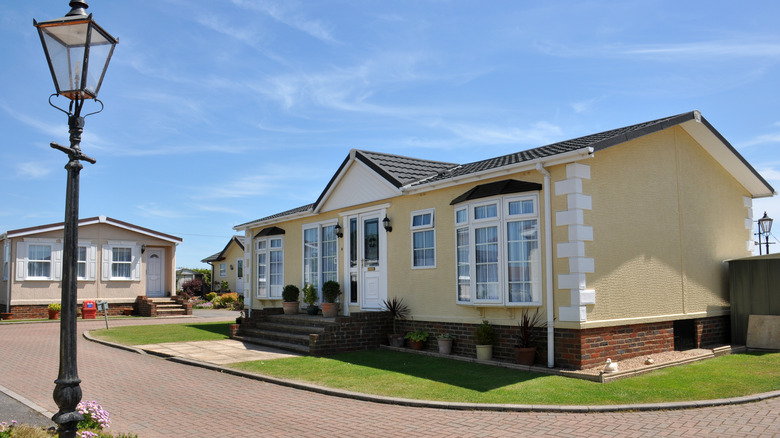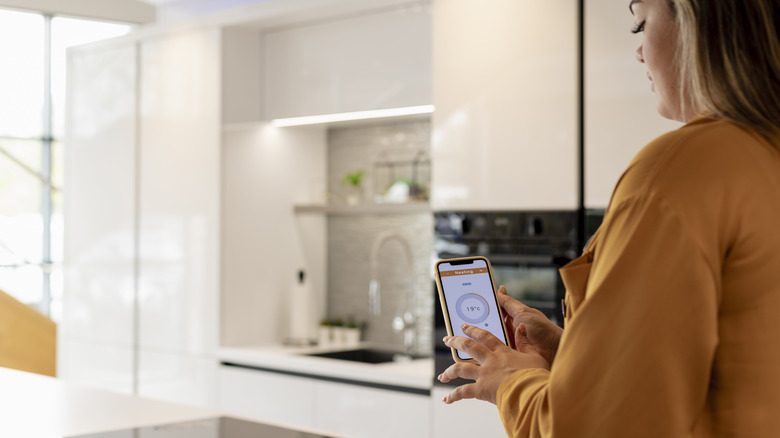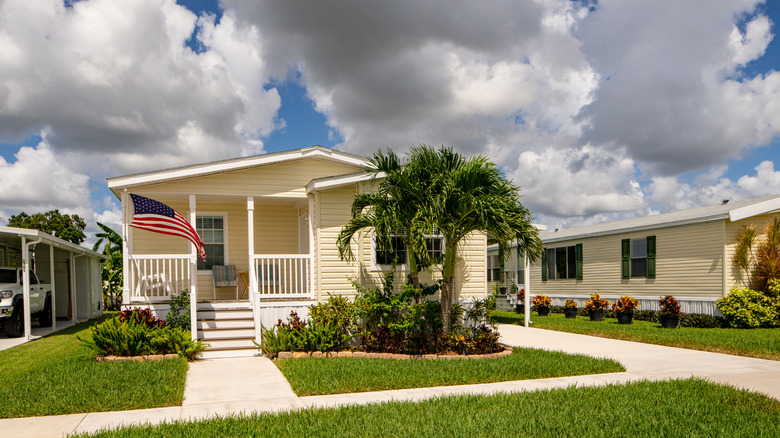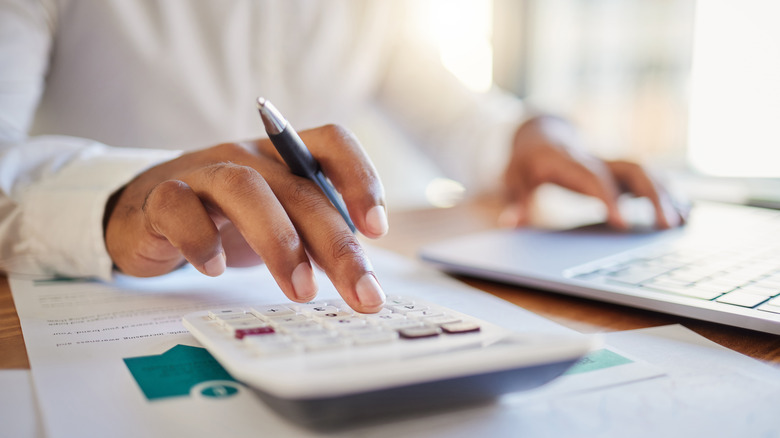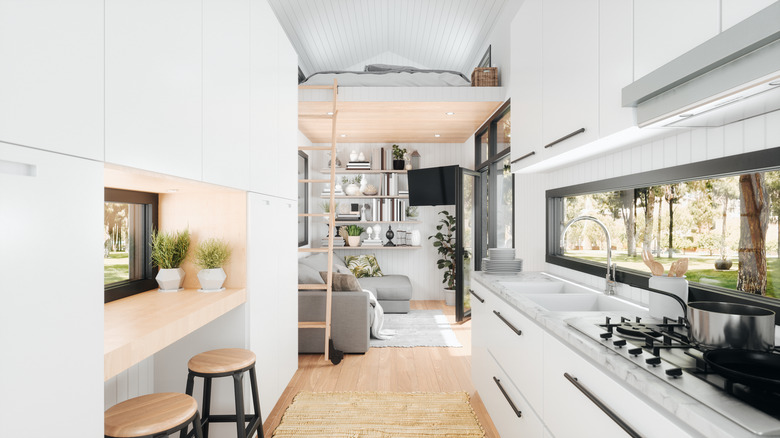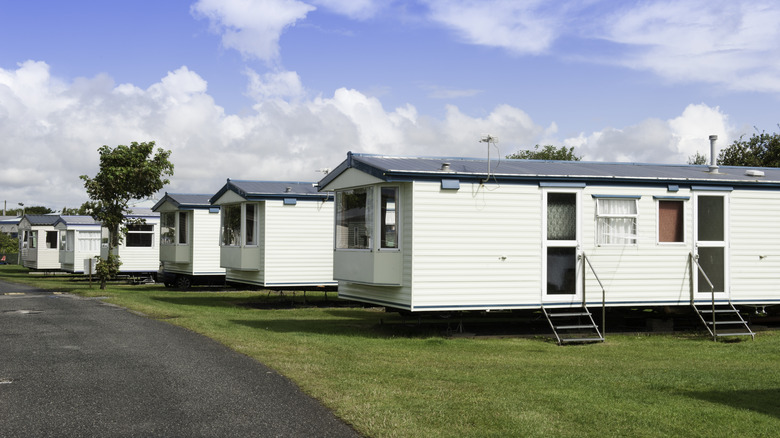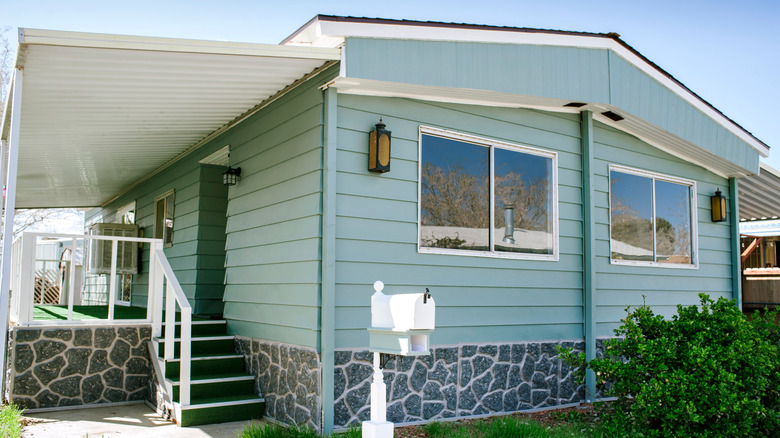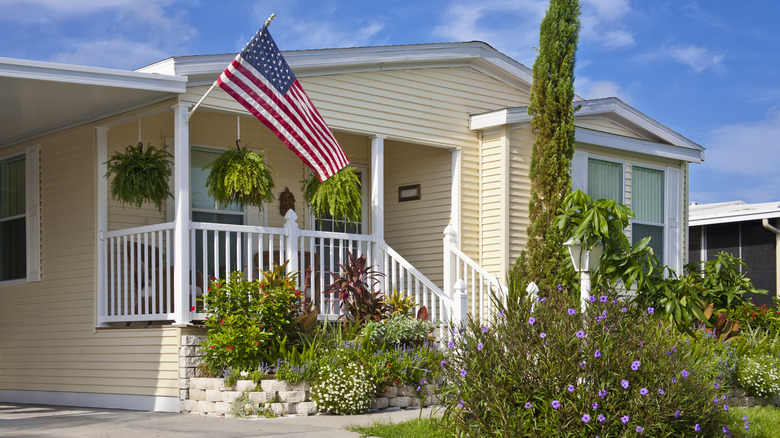Everything You Need To Consider Before Buying A Mobile Home
If you are considering or have ever been curious about buying a mobile home, there are a few things you should know before you take the plunge. By definition, a mobile home (sometimes referred to as a manufactured home, though a manufactured home cannot be moved), is simply a home that is on wheels, hence why it is "mobile." There are different types of mobile home: ones that stay put in a mobile home park and don't move, and ones that can be hooked up to a moving vehicle and transported.
The typical layout of a mobile home includes a bedroom (sometimes two or three), a small kitchen and dining area that often doubles as a living room, and a bathroom. Though they usually don't include any fancy appliances, most mobile homes do have an oven and a stovetop built-in. All types of mobile homes can offer different benefits such as flexibility, but also downsides like higher interest mortgage rates, so it's important to properly research when it comes to purchasing a mobile/manufactured home.
Flexibility
The first pro of buying a mobile home is the flexibility it offers. With a mobile home, you can decide where you want to live. While you can do this with a traditional home, too, a mobile home gives you an even greater degree of flexibility in choosing your specific living conditions. You can either choose to set up camp in a private area to enjoy peace and quiet, or live in a mobile home park for a sense of community.
An important thing to note is that, while it's possible to move a typical mobile home once it has been set up on land, it isn't an easy thing to do. Still, the flexibility you gain from being able to choose the conditions in which you live more than make up for it. A mobile home is also a great option if you already own land and want to use it. This way, you won't be subject to mobile home park fees (you may be required to pay other fees depending on the state you live in, though).
Eco-friendly
These days, more buyers are looking for an eco-friendly home, and a mobile home fits the bill. Although this doesn't apply to all mobile homes, the type that are designed to sit in one place can be extremely energy-efficient. In fact, per a 2012 report by the American Council for an Energy-Efficient Economy, on average someone living in a manufactured home will use 35% less energy than someone living in a detached single-family home. Moreover, per Moving.com, the Manufactured Housing Institute states that mobile homes are built in a method that causes up to "90 percent less waste and environmental impact than site-built housing."
This is good for a couple of reasons. Firstly, because you can save on bills — an energy-efficient home is one that will cost less to run, and secondly, because you're doing your bit for the planet without sacrificing any home comforts. Of course, this pro does come with some caveats, namely that each person's energy use will depend on how they like to heat their home, but on the whole this is a major plus.
A way to get into a place
If you really love an area but can't afford to buy or rent the space you need there, a mobile home is an excellent way to get into this area without the issue of budget. Typically, this means buying a manufactured home that stays put in the area or just outside of it, but if you have a mobile home that travels you could also set up camp in your desired area/s for a period of time (note that some areas don't let you do this, so it's always best to check the individual rules for states and counties).
The best thing about this pro is that it lets you live where you want without the problem of having to budget for a house or an apartment, which is the main thing that often deters people from moving to their dream area. Plus, as an extra bonus for those with portable mobile homes, if you move in and decide the area actually isn't for you, you can simply move onto the next area.
Low buying price
Due to their smaller size, mobile homes will cost a lot less to buy than a regular home. Even when you factor in paying rent for land to park your mobile home on, the savings will still be huge. Per U.S News, in 2022 the average mobile home cost $125,000, though this price can increase or decrease depending on where the home is (for example, a mobile home is cheaper on average in the Midwest and most expensive on the West Coast).
Not only is this a huge perk if you can't stretch your budget, but an additional way in which a mobile home is great is if you are planning to buy a traditional home and do it up. Rather than making yourself miserable by living in a renovation project, buying a mobile home nearby could definitely be a worthwhile investment if you think upgrading a home will take years to complete. In terms of bills, the cost will hinge on factors like whether you have a propane or natural gas tank and how many lights and electrical devices you have in your mobile home overall.
Customizable
The tiny house trend shows no signs of slowing down, and a mobile home is the perfect base to make your own cozy space. If you choose a mobile home from scratch, it will be far more customizable than a pre-bought one, but the beauty of mobile homes and small spaces in general is that they force you to get creative. There's no room for clutter or storage, so everything needs to have its own place.
While this may sound like a nightmare for some, for others being able to customize a space completely is a dream come true. The best thing about mobile homes is they come with literally everything you need, but you can still put your own spin on a space, for example by adding extra storage in one part or making your living area smaller for a bigger bathroom. There are heaps of tiny home hacks out there to help you maximize your mobile home and get the most out of your space.
Depending on which size you buy, it might not be comfortable for larger families
There are plenty of pros when it comes to mobile homes, but there are some cons you need to consider, too. One of these cons is that mobile homes might be less comfortable for larger families than traditional homes. It all depends on what size you buy. If you're buying a mobile home due to money constraints, you might want to get a single-wide home, which is typically between 500 to 1,200 square feet and costs $57,000 to $64,000. This would offer a tight squeeze for a family of four.
However, that same family would be comfortable in a triple-wide house, which has over 2,000 square feet. But that can clock in between $80,000 and $177,000. In comparison, a new construction house of the same size can cost between $200,000 to $300,000. Another thing to think about is that most larger mobile homes are the type that sit on a base in a specific area and cannot be moved, taking some of the flexibility of owning a mobile home out.
Paying rent on land
If you buy a mobile home that sits in a park or on a specific designated area, you will have to pay rent for the land your home is on. This is not included with your regular mobile home bills and can be quite pricey depending on the area and who you are renting from (i.e. a person or a company). In addition to paying rent for the land your mobile home is on, you may have to contribute fees for things like grass cutting and general park maintenance.
Sometimes, you can opt out, but often there are rules that cannot be flouted such as mobile home park curfews or not being allowed furniture outside your home. This is something you need to be aware of so you can plan appropriately and make sure you have enough left in your budget to cover all expenses, not just what you have worked out for your gas and electricity bills.
Can attract stigma
Although mobile homes have evolved into multifunctional spaces, there is still a certain level of stigma that surrounds them. This mostly applies to mobile homes in older parks or those that appear a bit rundown. For example, in a study published in "Qualitative Sociology," researchers investigated how mobile home residents in West Central Florida navigated the stigma attached to living in such a community. They found they had to employ tactics such as ignoring, arguing, dolling up their situation, blaming, and using humor in order to navigate social opinion.
A negative view toward your mobile home could not only make you feel down, but could also have a negative effect if you decide to sell your mobile home. While they appreciate in value just like traditional homes, they don't grow in value as quickly. "The problem with appreciation [of a manufactured home] is there is a stigma that comes with these homes. So, while you might see a site-built home appreciate 5-6% in a year, a manufactured home might only see 3-4% appreciation — they typically lag by about two points," Jason Blackburn, former owner of Lonestar Modular Homes, told Lev. However, you can see a higher spike if you take care of your home and put more into it — such as upgrading it with nicer siding or making the interiors feel modern. It's also much easier to sell at a profit if you own the land it's sitting on and you sell the parcel with it. But it will usually grow at a slower rate than a traditional home, especially if you're renting the land.
Mortgage rates
Depending on where you buy and the size of your mobile home, you may need to look into getting a mortgage to help you buy. Unfortunately, a major downside and something you absolutely need to know when hunting for a mobile home is that getting a mortgage can be tricky. You could also find yourself faced with a bad mortgage rate when trying to buy a mobile home.
This is because mobile homes fall under being personal property, which makes them much more difficult to get a good mortgage loan for. Personal property loans, also known as chattel loans, usually have worse conditions such as higher interest rates and shorter-term contracts, meaning you'll have to renegotiate often. Plus, banks consider personal property loans riskier than giving a regular loan for a house. To avoid paying through the nose in interest, you could have to save up more money to put down upfront before committing to a mortgage that will make you worse off in the long run.
One caveat is that if your mobile home meets some very specific requirements, you might be able to get a traditional mortgage. For example, Fannie Mae's MH Advantage program offers a 30-year mortgage, but only if it's at least 600 square feet and you own the land it's sitting on.
Less durable overall
The last thing you should know about mobile homes is that, on the whole, they are not built for heavy durability. Unlike traditional homes, which typically have a strong foundation that will hold the house up and protect it against inclement weather, the single-story construction of a mobile home won't hold up as well against stormy weather conditions.
However, that doesn't mean your mobile home will blow away during a storm. Thanks to laws set by the U.S. Department of Housing and Urban Development (HUD) in the 1990s, mobile homes need to be built to survive wind speeds that are common in the area they're being sold and set up. For example, if you live in Wind Zone I, your home needs to withstand wind speeds of 70 mph, but if you live in Wind Zone III, it needs to stay intact even during a category two hurricane. However, they still pose a higher risk during a storm than a traditional home. Since 1996, 53% of tornado-related deaths happened in mobile homes, even though they only make up 6% of the housing market. This was mostly due to poor anchoring.
Another aspect to consider is if you plan to travel with your mobile home, which could make it wear down faster. You'll need to keep up maintenance for your mobile home, both to make sure it works properly and to get the most resale value if you do decide to sell it in the future.
